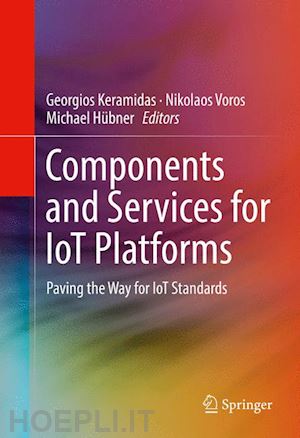
Questo prodotto usufruisce delle SPEDIZIONI GRATIS
selezionando l'opzione Corriere Veloce in fase di ordine.
Pagabile anche con Carta della cultura giovani e del merito, 18App Bonus Cultura e Carta del Docente
This book serves as a single-source reference to the state-of-the-art in Internet of Things (IoT) platforms, services, tools, programming languages, and applications. In particular, the authors focus on IoT-related requirements such as low-power, time-to-market, connectivity, reliability, interoperability, security, and privacy. Authors discuss the question of whether we need new IoT standardization bodies or initiatives, toward a fully connected, cyber-physical world. Coverage includes the research outcomes of several, current European projects related to IoT platforms, services, APIs, tools, and applications.
Part I Platforms and Design Methodologies for IoT Hardware.- 1 -Shaping Configurable Micro-Processors for IoT Devices.- 2 Shaping Configurable Micro-Processors for IoT Devices.- 3 AXIOM a Flexible Platform for the Smart Home.- PArt II Simulation, Modeling and Programming Frameworks for IoT.- 4 Internet of Things Simulation using OMNeT++ and Hardware in the Loop.- 5 Towards Self-Adaptive IoT Applications: Requirements and Adaptivity Patterns for a Fall-Detection Ambient Assisting Living Application.- 6 Small Footprint JavaScript Engine.- 7 VirISA Recruiting Virtualization and Reconfigurable Processor ISA for Malicious Code Injection Protection.- Part III Opportunities, Challenges and Limits in WSN Deployment for IoT.- 8 Deployment Strategies of Wireless Sensor Networks for IoT: Challenges, Trends and Solutions Based on Novel Tools and HW/SW Platforms.- 9 Wireless Sensor Networks for the Internet of Things barriers and synergies.- 10 Event Identification in Wireless Sensor Networks.-Part IV Efficient Data Management and Decision Making for IoT.- 11 Integrating IoT and Fog Computing for Healthcare Service Delivery.- 12 Supporting Decision Making for Large-Scale IoTs: Trading Accuracy with Computational Complexity.- 13 Fuzzy Inference Systems Design Approaches for WSNs.- Part V Use Cases for IoT.- 14 IoT in Ambient Assistant Living Environments: A View from Europe.- 15 Software Design and Optimization of ECG Signal Analysis and Diagnosis for Embedded IoT Devices.- 16 Design for a System of Multimodal Interconnected ADL Recognition Services.- 17 IoT Components for Secure Smart Building Environments.- 18 Building Automation Systems in the World of Internet of Things.
Prof. Dr. Ing. habil. Michael Hübner is the Chair for Embedded Systems for Information Technology (ESIT) at the Ruhr University of Bochum (RUB) since April 2012. He received his diploma degree in electrical engineering and information technology in 2003 and his PhD degree in 2007 from the University of Karlsruhe (TH). Prof. Hübner did his habilitation in 2011 at the Karlsruhe Institute of Technology (KIT) in the domain of reconfigurable computing systems. His research interests are in reconfigurable computing and particularly new technologies for adaptive FPGA run-time reconfiguration and on-chip network structures with application in automotive systems, incl. the integration into high-level design and programming environments.











Il sito utilizza cookie ed altri strumenti di tracciamento che raccolgono informazioni dal dispositivo dell’utente. Oltre ai cookie tecnici ed analitici aggregati, strettamente necessari per il funzionamento di questo sito web, previo consenso dell’utente possono essere installati cookie di profilazione e marketing e cookie dei social media. Cliccando su “Accetto tutti i cookie” saranno attivate tutte le categorie di cookie. Per accettare solo deterninate categorie di cookie, cliccare invece su “Impostazioni cookie”. Chiudendo il banner o continuando a navigare saranno installati solo cookie tecnici. Per maggiori dettagli, consultare la Cookie Policy.